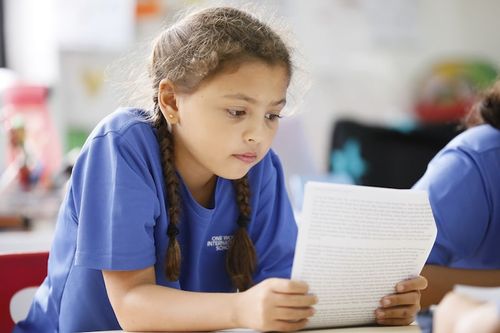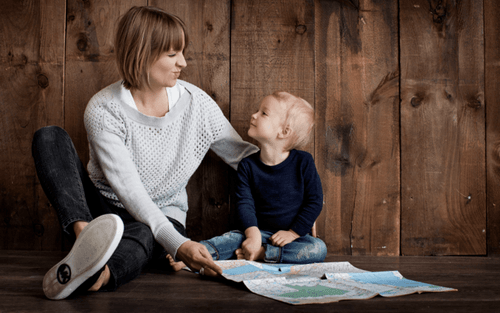Learning a new language comes with its own challenges, especially when your child is also adjusting to a new school and culture. Here’s an overview of the customised approach for second language acquisition at OWIS and the student-centred approach to teaching English as a second language.
What Does An Effective Second Language Acquisition Programme Look Like?
Effective language acquisition programmes plan instruction around themes as theme-based activities maximise opportunities for language and academic development. With every instructional unit, teachers incorporate essential language arts skills — reading, writing, listening and speaking. To enhance students’ respect for their own and other cultures, teachers include multicultural literature in the curriculum, which also stimulates a high level of involvement and participation. Students actively use the new language in class to boost their confidence and skills, and teachers track learners’ progress through regular assessments.

The Five Stages of Second Language Acquisition
- Pre-production or the Silent period. This stage lasts from zero to six months as it’s likely you won’t hear students speak the new language much. Students are spending time learning and practising basic vocabulary and pronunciation. But not all learners are necessarily silent; some of them frequently engage in self-talk as they apply what they learn.
- Early Production. During this stage, students begin using single words or two-word phrases and repetitive patterns. This stage may last six to twelve months, and students’ vocabularies reach about 1,000 words. Attempts to speak words and phrases don’t always follow grammatical rules.
- Speech Emergence. This stage lasts between one to three years, and students acquire a vocabulary of up to 3,000 words. As they practise stringing together phrases, sentences and questions, students build their comprehension skills. However, their grammar may not always be accurate. At this stage, students begin reading and writing the new language too.
- Intermediate Fluency. By this stage, students have excellent comprehension skills and a vocabulary of at least 6,000 words. Besides reading and writing more complex sentences, students begin thinking in the new language and make few grammatical errors. This stage can last from three to five years.
- Advanced Fluency. It typically takes students at least five years to get to this stage where they have a near-native level of speech, and understanding of the language. It takes another five years of learning the language to get to an advanced fluency stage and achieve full mastery of the language with all its nuances and complexities.
All students studying English as a Second Language (ESL) will pass through these stages until they master the language.
Language Learning Versus Language Acquisition and Our Approach at OWIS
Language learning involves teaching students about the rules, structure and nuances of the target language so they can learn to speak it. Language acquisition goes beyond merely teaching rules; students gain proficiency by using the language in meaningful ways. At OWIS, we use the latter approach to promote students’ involvement in their learning.
As students learn a new language, there is often a gap between basic interpersonal communication skills (language used face-to-face) and cognitive academic language proficiency (language used in the classroom). Students usually learn social language in six months to two years. But it can take up to five years to fully develop the specialised skills necessary for academic language proficiency.

At OWIS, we use a variety of strategies in our English as an Additional Language programme to close the gap, including:
- Deploying a child’s full linguistic repertoire or employing ‘translanguaging’ which means that the child uses all of the languages and language varieties available to them to communicate and understand the world around them. While these languages may be recognised as separate, for bilingual children they are all part of their language resources, or linguistic repertoire.
- Emphasising the value of the linguistic assets of our students. Teachers recognise what students can do across languages and assess them in the language they are comfortable in, which could be visual representations or drawings or simply another language. Artificial borders between languages are broken, creating spaces for deeper understanding.
- Incorporating multiple modalities, an instructional approach that caters to different learning styles and multiple intelligences to enhance student engagement. Teachers use visuals, music, poetry, writing, experiences, technology or other modes to teach content.
- Teaching language skills across the curriculum and presenting terms that align with upcoming lessons in various subjects.
- Incorporating students’ native languages to encourage bilingualism.
- Tailoring learning goals according to students’ grade levels and emotional development to instil confidence.
Supporting students’ first languages and cultures in addition to English as a second language increases the likelihood that they will become internationally minded, productive citizens, playing a vital role in contributing to the economy and society as a whole.
Effective for all EAL/ESL/English language learners (ELLs), our English language acquisition approach promotes learning in a highly-engaging, positive environment. To learn more about how our EAL programme can benefit your child, visit us virtually.
(This blog was originally written in collaboration with Ms Debakshi Sen, former EAL Teacher, OWIS Nanyang.)














